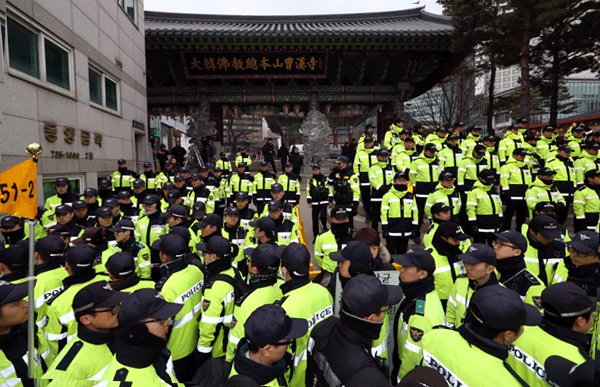Han Sang-kyun, the chief of the nation’s second-largest umbrella labor union wanted by police, decided Thursday to voluntarily leave Jogyesa Temple, where he has been hiding for 24 days.
The Korean Confederation of Trade Unions chief will hold a press conference before leaving the temple, upon which he is to be immediately questioned by police. Police had set a noon deadline for him to surrender himself, warning they would raid the temple if he refuses to come out.
 |
| (Yonhap) |
Han had been on the wanted list since June, for allegedly leading a violent rally on May 1 Labor Day. Another arrest warrant had been pending for him leading a demonstration on May 24 last year and attempting to march near Cheong Wa Dae. He has reportedly been hiding at the KCTU office before making an appearance at the Nov. 14 rally in Gwanghwamun that ended in clashes between pipe-wielding demonstrators and riot police firing back water cannons.
Two days after the rally, Han sought refuge at Jogyesa Temple, which has often served as a shelter for political and student activists seeking refuge from police crackdowns in times of authoritarian rule, notably under the military-backed governments of the 1980s. Police have been stationed outside the temple to prevent him from fleeing.
A major collision was averted Wednesday, as the police temporarily delayed their raid of the temple to detain Han.
Police halted the operation at around 6 p.m. in response to Buddhist monks’ renewed calls for a peaceful resolution to the issue.
As tensions intensified around Jogyesa temple, Buddhist monk Ven. Jaseung on behalf of the Jogye Order made a statement in a press briefing at 5 p.m., calling on both the police and the KCTU to end their standoff.
Police stationed nearly 1,000 officers inside and outside the temple and cleared the way leading to the room in which Han has been taking refuge by pushing away monks and temple officials who have stood at the entrance to bar the officers from storming into the building.
Only Buddhist monks, temple officials and journalists were allowed near the building Han was in to prevent clashes.
At the height of the standoff, monks were praying and temple officials held up placards reading “Let’s solve the problem peacefully” and “Opposition to the police force in the temple,” wishing for a peaceful resolution to the issue.
Kang Sin-myeong, the chief of the National Police Agency, threatened to raid the temple to execute an overdue arrest warrant unless Han came out of the temple voluntarily by 4 p.m.
As the scheduled police raid neared in the afternoon, tensions escalated as several civic groups and lawmakers made their way to the temple to voice their opinions on the police arresting Han.
“We want to ask whether the forcible execution of an arrest warrant complies with democratic values and the rule of law at this critical moment of wrangling over the labor market reform bills that can have a huge impact on laborers’ lives continues,” Jo Young-sun, a secretary general of Lawyers for a Democratic Society said, asking the temple to continue to provide Han with protection.
On the other side of the road, a conservative civic group comprised of some 100 elderly people held a demonstration to lambast the Jogye Order for hiding Han in the temple.
“The government should sternly punish North Korea sympathizers trying to topple our nation and undermine the rule of law,” the elderly group said, holding up placards reading “Immediately arrest Han Sang-kyun, who lead the violent protest.” Conservatives have often likened ultraprogressives with North Korea supporters.
Buddhist followers, mostly in their 50s to 80s, gathered outside the temple at around 3 p.m. to condemn the union chief for hiding in the religious venue and undermining the rule of law.
“Why have the police failed to arrest him until now? What did they do? Kick him out!” an elderly women told people around her. Others nodded along to her remarks, with some men bluntly shouting in the air, “Come out immediately!”
Earlier on Tuesday, Buddhist monks warned that a police raid on the temple would be no different from religious persecution and a crackdown on Korean Buddhism as a whole. The monks have also urged the labor union head to make a “swift decision” to end the cycle of violence.
“The Jogye order has strived to solve the issue through conversation, asking the police delay arresting him as we believe that the execution of the arrest warrant would not solve the conflicts, but would only lead to another conflict,” the monk Jaseung told reporters Wednesday. “We will decide what to do about his stay here by noon tomorrow.”
Considering the temple’s request, the police decided to delay arresting him until Thursday at noon.
“We planned to execute the arrest warrant, but will delay it to tomorrow afternoon, considering the Buddhist monk Jaseung’s request,” the police said. “But if Han does not voluntarily appear by noon tomorrow, we will sternly execute the court-issued warrant.”
At Han’s request, the Jogye Order — the nation’s largest Buddhist sect with several million followers — has played a mediation role between the labor activist and the government since he took refuge there.
Meanwhile, the labor union renewed its pledge for an all-out strike upon the police’s forcible arrest of its chief.
“The trade unions under the KCTU will stage a strike at the earliest possible moment if the police forces their way into the temple to drag him out. We will step up our fight against the government crackdown and its attempt to reform the labor market,” Park Sung-sik, a spokesperson for the KCTU said in a statement.
By Ock Hyun-ju (laeticia.ock@heraldcorp.com)

